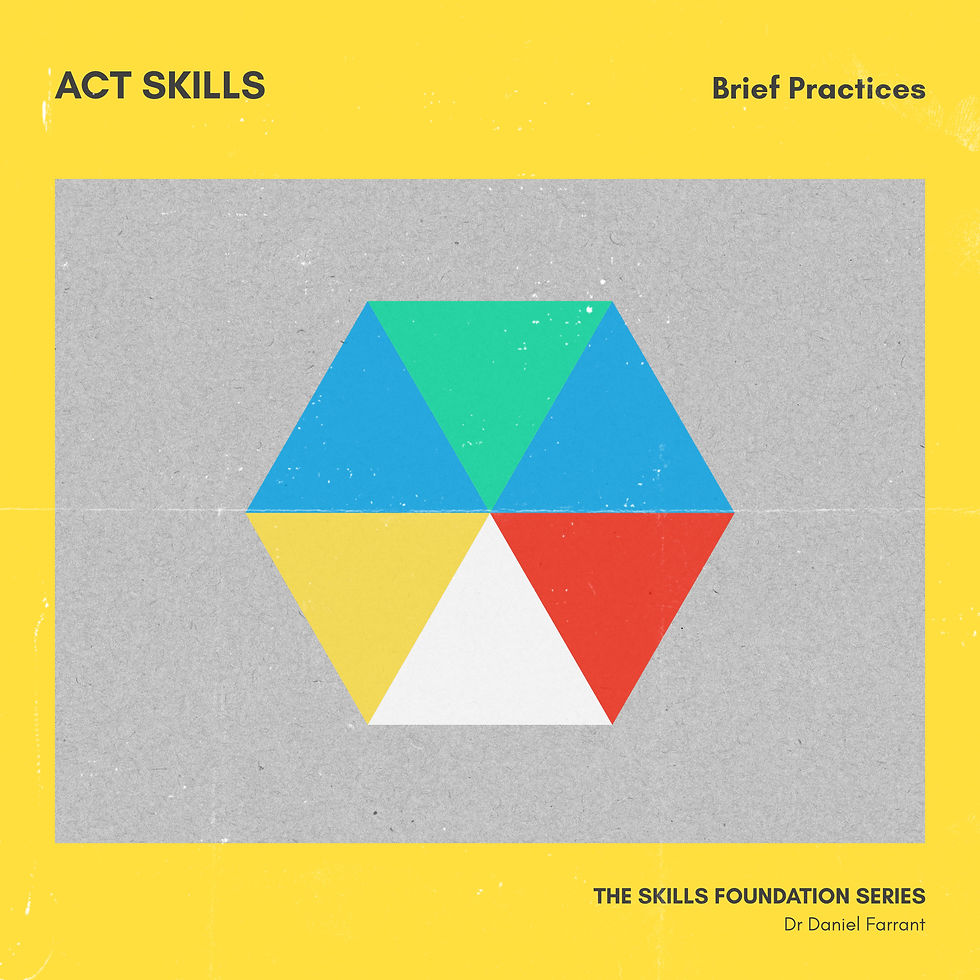Acceptance & Commitment Therapy: A Brief Introduction
- Dr Daniel Farrant

- Oct 8, 2019
- 3 min read
Updated: Feb 9, 2023

Acceptance and Commitment Therapy (ACT) focuses on being present, being aware, knowing our values, and taking action. Here you’ll find a brief introduction to this popular approach to therapy, and some practices to help develop ACT skills.
An ACT therapist won’t focus on helping people to feel ‘good’. Instead, they will acknowledge there is pain in life, and work to reduce the suffering we cause by fighting against pain. They will focus on the importance of being present, being aware, knowing our values, and taking action toward building a meaningful life. This can often lead to less suffering, more satisfaction, and greater happiness.
ACT has been referred to as a ‘trans-diagnostic’ model. This means that rather than looking for a diagnostic label (like depression or anxiety) and prescribing a treatment approach based on that diagnosis, it looks at the processes underlying human suffering. You could say it looks at the causes rather than the symptoms. In this way an ACT focused approach is flexible and can be applied to many people experiencing many different things.
ACT is considered a ‘3rd wave’ therapy. It is one of the mindfulness based therapies that came after behavioural (1st wave) and cognitive (2nd wave) therapeutic approaches. ACT is a form of cognitive behavioural therapy that takes a mindful approach to thoughts and feelings. That means seeing difficult thoughts and feelings as part of being human, and not focusing on actively changing them — but noticing them, and allowing them to come and go. ACT also focuses on staying in touch with who we want to be, and taking actions aligned with our values — even when difficult thoughts and feelings make it hard. It’s all about being more psychologically flexible.
To help people become more psychologically flexible, ACT therapists focus on six interrelated processes. These processes are illustrated in the diagram below: a hexagon showing six processes that lead to greater psychological flexibility.

ACT involves learning skills that help us with six interacting processes:
Defusion
Being able to step back from our thoughts, feelings and urges (rather than getting lost in them).
Acceptance
Opening up and being willing to experience the full range of thoughts and emotions we are likely to have in our lives (rather than fighting with them, or trying to ignore them or distract ourselves from them).
Flexible attention to the present moment
Being able to focus on what is here around us and within us now, and being able to shift our attention from one thing to another (rather than being lost in thought, and getting fixated on one thing or another).
Self as context
Being able to observe our feelings, sensations and urges, and all of the conceptions we have about ourselves, other people, and the world (rather than being caught up in them and driven by them). Being able to look at things in a flexible way, from different perspectives.
Values
Knowing and being connected with what is important to us (rather than being out of touch with our values).
Committed action
Behaving in ways that match our own personal and chosen values in different areas of life - health, family and friends, work, etc (rather than behaving in ways that go against our values). Doing this moment to moment as we go through our day.
According to an ACT worldview, if we can develop these skills in our life we will become more flexible in our thoughts, feelings and behaviours, experience less suffering, and live a more meaningful life connected to what is important to us.
Short Video Summary
Here is a summary from Brian Johnson of a good introductory book on ACT by Dr Russ Harris.The book is called ‘The Happiness Trap’.
Four ACT Practices
And here are some short ACT practices. There is a practice for each of the first four skills: defusion, acceptance, attention to the present moment, and self as context. Learning new skills takes time, so if you are inclined please do try these brief practices over the next few days.
I hope you have enjoyed this brief intro to ACT. If you have any comments, questions or feedback, please do reach out through the contact section; it would be great to hear from you.





Comments